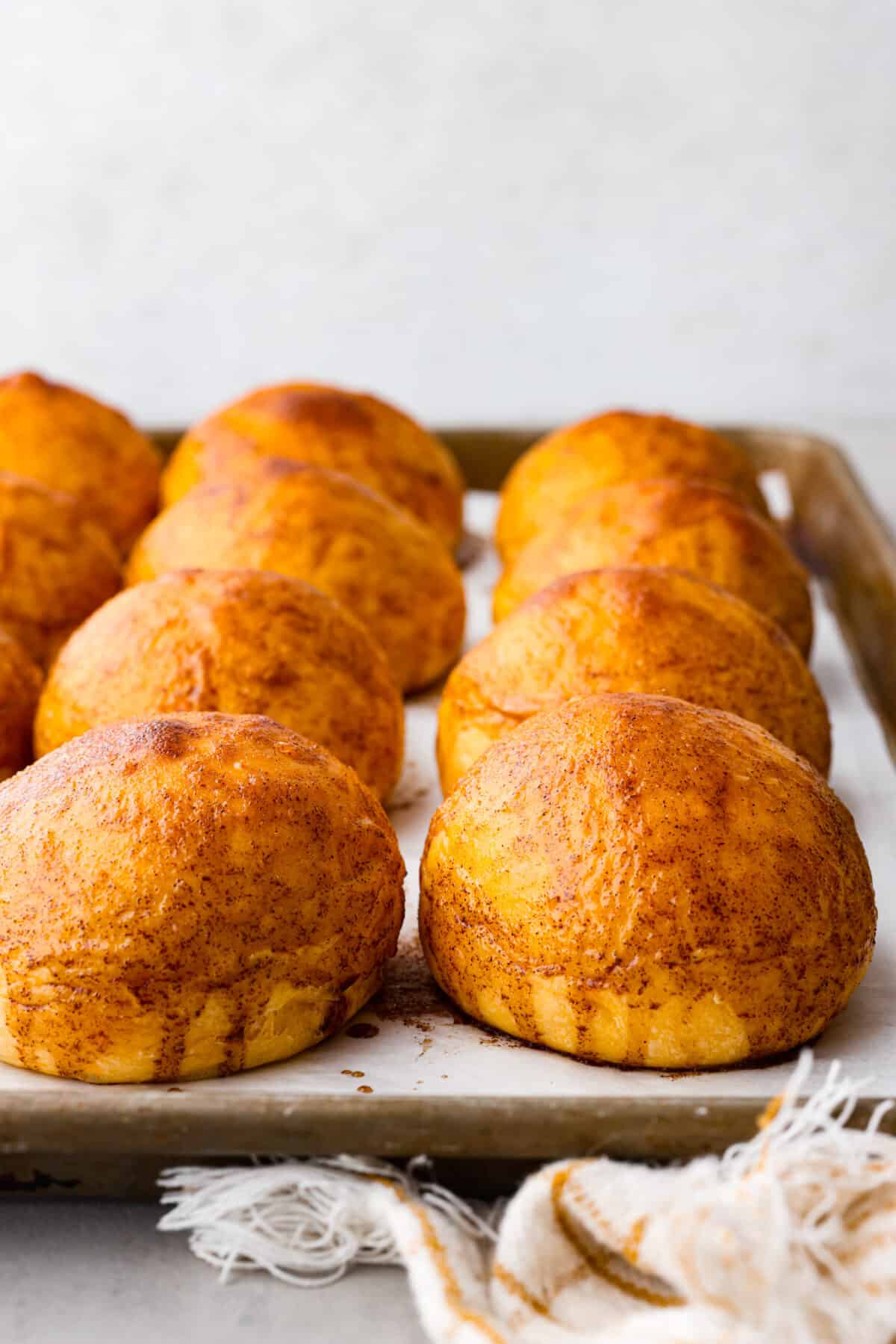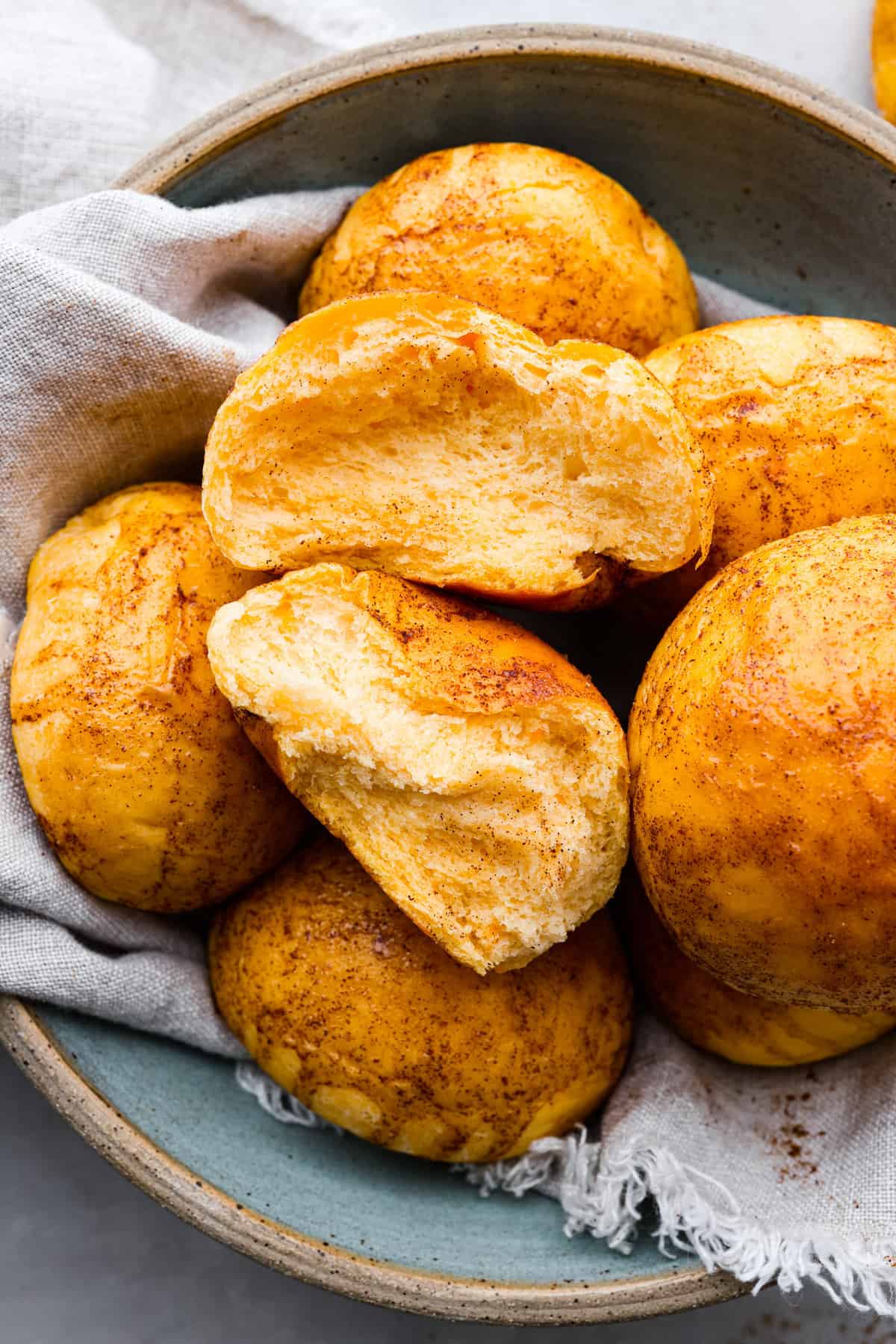[ad_1]
This website may contain affiliate links and advertising so that we can provide recipes to you. Read my disclosure policy.
These soft and fluffy sweet potato rolls are brushed with a brown sugar glaze and will melt in your mouth! Adding sweet potatoes to the dough results in the most incredible texture. Meet your new favorite dinner roll!
Sweet potatoes are such a versatile ingredient that I love to use! It’s great for baking and cooking. Make my sweet potato pilaf, this casserole, or these easy sweet potato chips in the air fryer.

What Are Sweet Potato Rolls?
The addition of sweet potatoes to this bread dough is life-changing! The moisture in potatoes results in the fluffiest rolls with an INCREDIBLE texture. You will love the subtle sweetness and color the sweet potatoes add. However, the best part is the brown sugar glaze! It’s buttery and sweet with a hint of cinnamon. The perfect compliment to these rolls.
These sweet potato rolls are the world’s softest rolls! One bite of these warm sweet potato rolls and you’ll agree. If you’re looking for more roll recipes to make, try these easy 1-hour rolls. You’ll also love these Parker house rolls or everyone’s favorite Texas Roadhouse copycat rolls.
Ingredients in Sweet Potato Rolls
These ingredients are really simple, and you probably already have them all on hand. These are the perfect rolls to make ahead to enjoy with dinner or for Thanksgiving. Your guests will LOVE these fluffy rolls! Check out the recipe card at the bottom of the post for exact measurements.
Rolls
- Active Dry Yeast: You will activate this yeast with some warm milk.
- Sweet Potatoes: Dice, cook, and mash the sweet potatoes to add to the dough.
- Sugar: You will add this in with the yeast.
- Whole Milk: Your milk should be warm, not hot! Otherwise, it will kill the yeast.
- Butter: I used unsalted butter in this roll recipe.
- Flour: I used all-purpose flour in these sweet potato rolls.
- Salt: This will enhance the flavor of the ingredients.
Brown Sugar Glaze
- Butter: Melt the butter for the glaze so that you can brush it on the rolls.
- Brown Sugar: Sweetens the glaze giving it a golden caramel flavor.
- Cinnamon: Adds delicious flavor to the glaze.
How to Make Sweet Potato Rolls
There may be a lot of steps to making these sweet potato rolls, but they are surprisingly easier than you think! The dough comes together quickly then it just needs time to rise. You’ll have the softest homemade rolls ready to enjoy in no time.
Prepare the Dough
- Dice the potatoes into 1-inch cubes, I used 2 small sweet potatoes. Bring a pot of water to a boil, add the sweet potatoes, and boil until it is fork tender. Mash the boiled sweet potato until smooth.
- Mix the active dry yeast, sugar, and warm milk in the bowl of a stand mixer. Let sit until it starts to froth, about 5 minutes. This indicates that your yeast is active and ready to use.
- To the yeast mixture, add the mashed sweet potato, butter, 3 ½ cups flour, and salt. Using a dough hook, mix on low until combined. Determine at this point whether or not you want to add additional flour. If the dough isn’t pulling away from the mixer, add flour in ¼ cup at a time.
- Once the dough has the desired texture, mix for an additional 2 to 4 minutes on a medium speed to develop the gluten.
Rise the Dough
- Remove the dough from the mixing bowl and put it into a separate, lightly greased bowl. Cover your dough with plastic wrap or a warm damp towel and let it rest for about an hour until the dough doubles in size.
- Once the dough doubles in size, remove it from the bowl and fold. The goal of a fold is to degas and stretch the dough slightly then form it back into a ball. This helps develop the gluten. Return it back to the bowl and let it rest for another half hour.
- While the dough rests, prepare your pan. Line a baking sheet with parchment paper and lightly spray with cooking spray.
Shape and Rise the Sweet Potato Rolls
- Once the dough has risen again, dump it onto a lightly floured surface and stretch slightly into a square, about 12 inches by 12 inches. Cut 12 rolls out of the dough.
- Roll the sections of dough into balls and place them, evenly spaced, onto the prepared baking sheet.
- Cover the sweet potato rolls and let them proof until about double in size. While the rolls are proofing, preheat the oven to 375 degrees Fahrenheit.
Bake and Brush With Glaze
- When the rolls are about double in size, place them in the oven and bake for 10-15 minutes. The rolls should be a light golden brown and have an internal temperature of 190 degrees Fahrenheit.
- While the rolls are baking, make the brown sugar glaze. In a small bowl, whisk together the butter, brown sugar, and cinnamon.
- When the sweet potato rolls are finished baking, brush them generously with the brown sugar glaze. Allow them to rest for a few minutes before serving.

Tips For Making Sweet Potato Rolls
I love using leftover sweet potatoes to make these rolls! It’s the first thing I want to make when I have mashed sweet potatoes. Here are some tips when making these delicious sweet potato rolls.
- Don’t Use Cold Potatoes: Let your leftover mashed potatoes come to room temperature or warm them slightly in the microwave before using them in this recipe.
- Roll Size: I made 12 with this recipe, they were fairly large but you can split the dough into 24 rounds instead to feed more people.
- Skip the Glaze: Although I don’t recommend this, you can forgo using the brown sugar glaze if you want them to be more savory

Storing Sweet Potato Rolls
The best part about leftover sweet potato rolls is that they stay soft for days! Just reheat them in the microwave. They’re warm and fluffy and back to tasting like they’re fresh from the oven. Here are some instructions on how you can store them for later.
- Room Temperature: If you plan on serving these within 24 hours, then you can store them at room temperature in an airtight container.
- In the Fridge: If you have leftovers and plan on keeping them for more than a day, then you should store them in your fridge for 2-4 days after baking them.
- In the Freezer: You can freeze these rolls and thaw them out before enjoying them. Freeze them in an airtight container or sealable ziplock bag. Once they are thawed, I like to place them in an oven preheated to 375 degrees Fahrenheit for 5 minutes. This brings them back to life!
- To Reheat: Reheat room temperature or refrigerated sweet potato rolls in the microwave for 20 seconds and they are as good as new! Soft, fluffy, and warm.

More Delicious Sweet Potato Recipes
Sweet potatoes are a staple ingredient for so many recipes. Use sweet potatoes in sweet breads, pies, and savory dishes. They’re so versatile and add great texture and flavor. I hope you try some of our favorite sweet potato recipes because I know you’re going to love them!
Pin this now to find it later
Prepare the Dough
Dice the potatoes into 1-inch cubes, I used 2 small sweet potatoes. Bring a pot of water to a boil, add the sweet potatoes, and boil until it is fork tender. Mash the boiled sweet potato until smooth.
Mix the active dry yeast, sugar, and warm milk in the bowl of a stand mixer. Let sit until it starts to froth, about 5 minutes. This indicates that your yeast is active and ready to use.
To the yeast mixture, add the mashed sweet potato, butter, 3 ½ cups flour, and salt. Using a dough hook, mix on low until combined. Determine at this point whether or not you want to add additional flour. If the dough isn’t pulling away from the mixer, add flour in ¼ cup at a time.
Once the dough has the desired texture, mix for an additional 2 to 4 minutes on a medium speed to develop the gluten.
Rise the Dough
Remove the dough from the mixing bowl and put it into a separate, lightly greased bowl. Cover your dough with plastic wrap or a warm damp towel and let it rest for about an hour until the dough doubles in size.
Once the dough doubles in size, remove it from the bowl and fold. The goal of a fold is to degas and stretch the dough slightly then form it back into a ball. This helps develop the gluten. Return it back to the bowl and let it rest for another half hour.
While the dough rests, prepare your pan. Line a baking sheet with parchment paper and lightly spray with cooking spray.
Shape and Rise the Rolls
Once the dough has risen again, dump it onto a lightly floured surface and stretch it slightly into a square, about 12 inches by 12 inches. Cut 12 rolls out of the dough.
Roll the sections of dough into balls and place them, evenly spaced, onto the prepared baking sheet.
Cover rolls and let proof until about double in size. While the rolls are proofing, preheat the oven to 375 degrees Fahrenheit.
Bake and Brush With Glaze
When the rolls are about double in size, place them in the oven and bake for 10-15 minutes. The rolls should be a light golden brown and have an internal temperature of 190 degrees Fahrenheit.
While the rolls are baking, make the brown sugar glaze. In a small bowl, whisk together the butter, brown sugar, and cinnamon.
When the rolls are finished baking, brush them generously with the brown sugar glaze. Allow them to rest for a few minutes before serving.
Serving: 1rollCalories: 124kcalCarbohydrates: 12gProtein: 2gFat: 8gSaturated Fat: 5gPolyunsaturated Fat: 0.3gMonounsaturated Fat: 2gTrans Fat: 0.3gCholesterol: 23mgSodium: 276mgPotassium: 125mgFiber: 1gSugar: 7gVitamin A: 3416IUVitamin C: 1mgCalcium: 44mgIron: 0.3mg
Nutrition information is automatically calculated, so should only be used as an approximation.
[ad_2]
Source link

Hi! I’m a dedicated health blogger sharing valuable insights, natural remedies, and the latest scientific breakthroughs to help readers lead healthier lives. With a holistic approach to wellness, I empower individuals with accessible and actionable content, debunking myths and offering practical tips for incorporating healthy habits.
